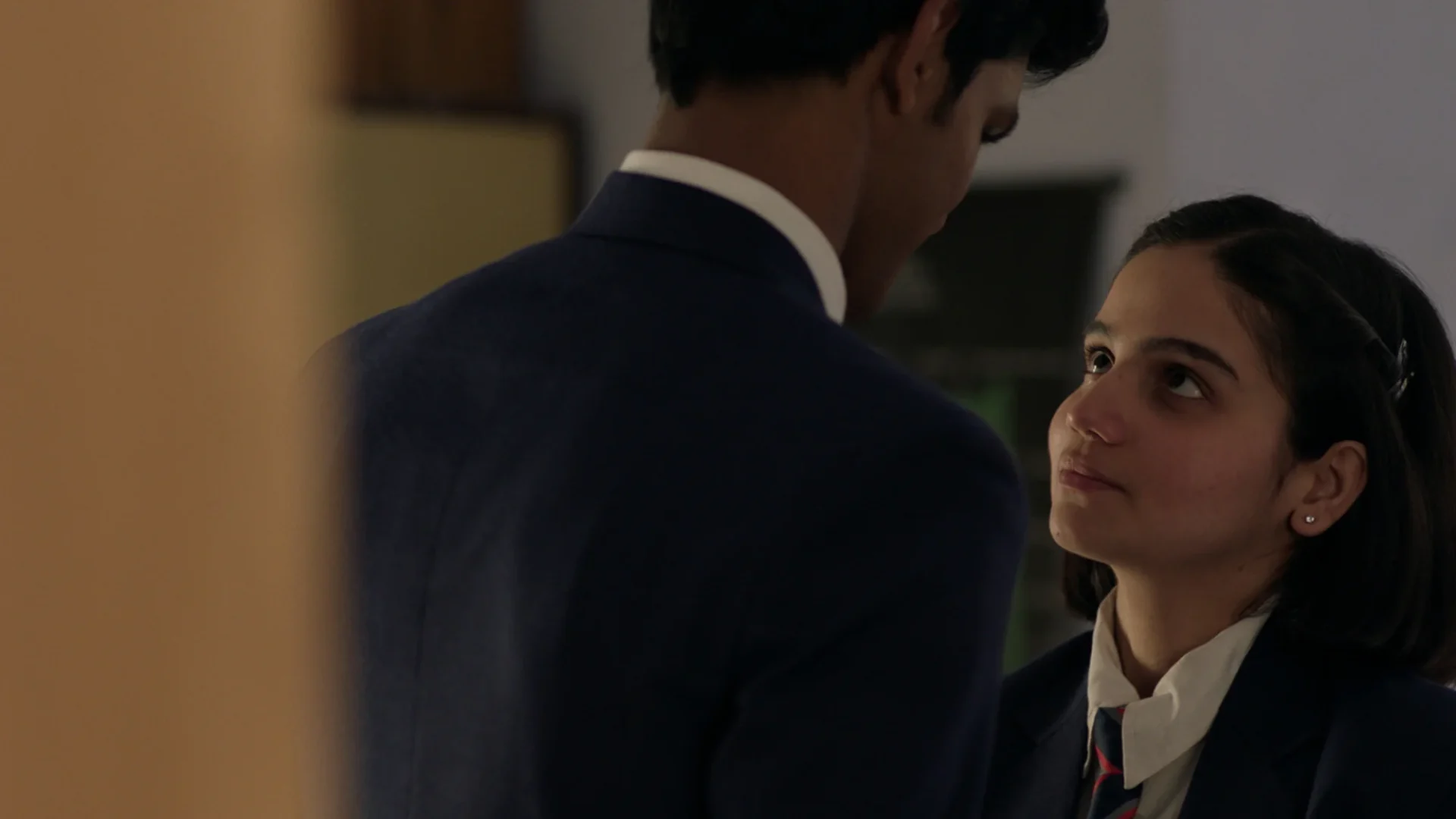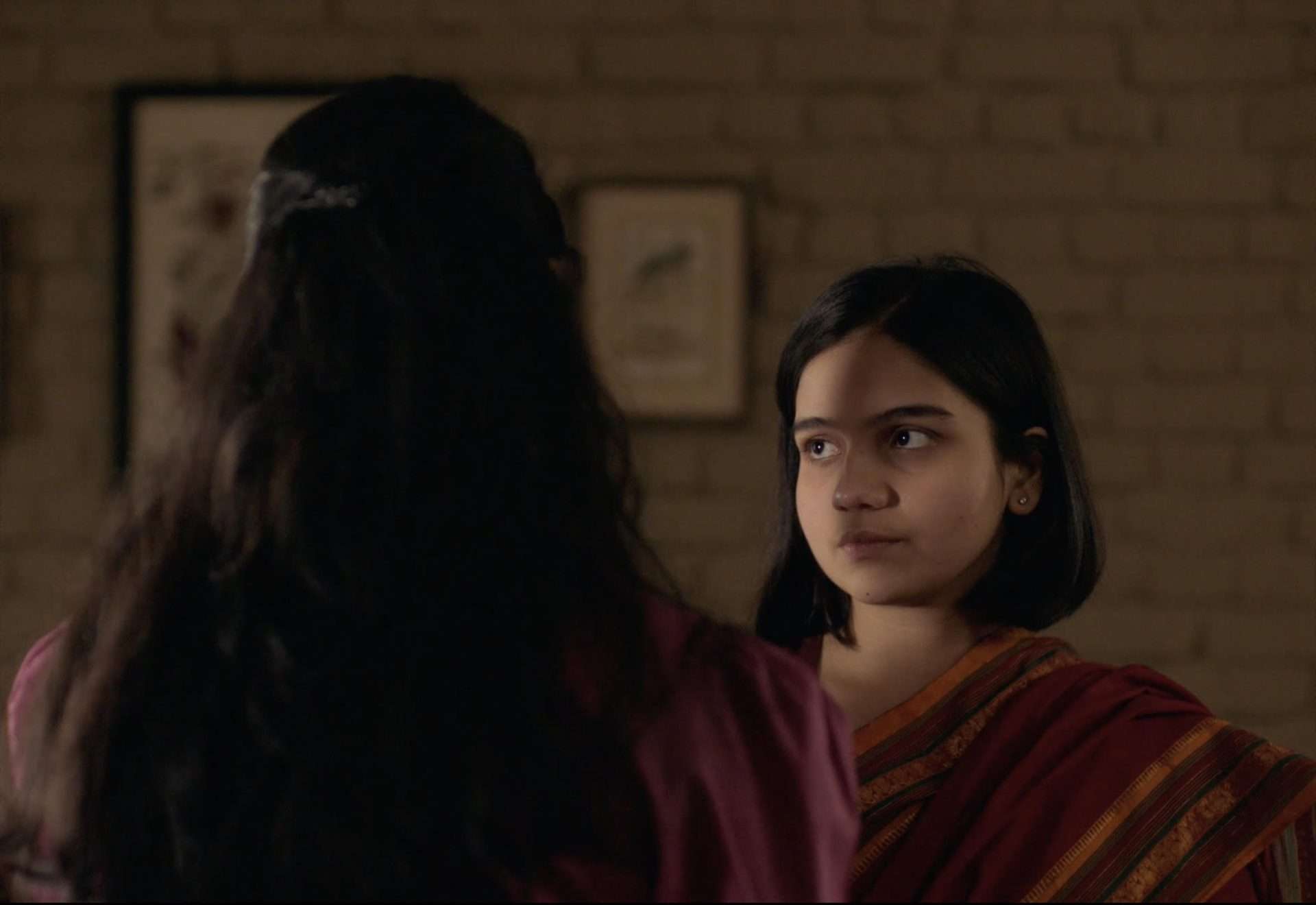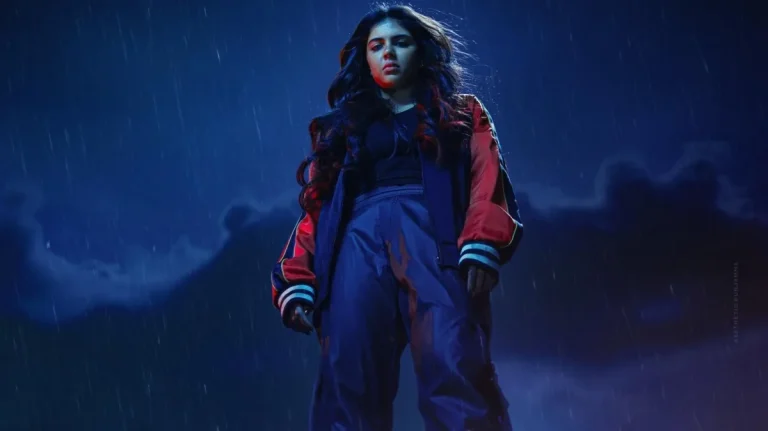“Girls Will Be Girls” (2024) marks an illustrious debut feature by Shuchi Talati— a homage to the yearning and gravity of girlhood against the backdrop of a meticulously structured Himachali co-educational institution. Talati artfully navigates the labyrinthine landscape of academic rivalries, illicit romantic encounters, drab uniforms, and the ever-present specter of disciplinary retribution. Employing the intimate confines of the 4:3 aspect ratio, Talati engages in the somber and often heartbreaking realities confronting women whose sexualities have been generationally stifled. With a deft hand, “Girls Will Be Girls” offers a dignity often denied to women protagonists treading sexual transgressions.
The film eschews simplistic moral judgments, neither vindicating nor demonizing their choices. Instead, it astutely posits that shame itself is the primary antagonist that stifles sexual expression and authenticity. Produced by Ali Fazal and Richa Chadha, this debut feature pulses unmistakably with female gaze. The influence of its predominantly female crew is keenly felt, manifesting in the tender, almost girlish curiosity of the camera work. Talati’s film is an unfettered exploration of girlhood—in its good, bad, and ugly, seeking not only to confront it head-on but to also empathize with the constraints that define it.
Mira (played by Preeti Panigrahi) epitomizes the paradox of exceptional intellect intertwined with isolation. Despite her prodigious academic prowess, she remains tragically devoid of genuine companionship, enduring the scorn of her peers who begrudge her authority and distinction. Mira embodies the archetype of the ideal student, with her meticulously trimmed hair, exemplary grades, and modest knee-length skirt. Yet she is not immune to the objectification that permeates her womanly existence. Sexism deeply pervades co-ed institutions, where the burden of dignity is disproportionately shouldered by girls from a tender age.
In this environment, boys are socialized to instill dread in their counterparts, while corrective measures are exclusively enforced upon the girls. Such rules fail to reflect the realities of the world beyond the controlled environment of the classroom. A particularly harrowing scene unfolds when Priya (Kajol Chugh) and Mira are subjected to a demeaning spectacle of comparison, compelled to ascend upon chairs as a visual metaphor for the voyeuristic gaze that shorter skirts invite. Women alter their very selves to avoid the gaze of men from a young age, internalizing and fostering a world where fear of men supersedes self-expression. Rape culture, thus perpetuated under the guise of disciplinary measures, disquietingly underscores the insidious ways in which girlhood is commodified and scrutinized.
Undoubtedly, male attention, or lack thereof rooted in patriarchy serves as a destabilizing force for women, impacting their bodily self-perception, self-worth, and romantic dependence. Anila, Mira’s mother (Kani Kusruti) recalls how, in her youth, their school segregated boys and girls. This consequently stripped her of the exhilarating allure of an illicit affair, untouched by its sweetness, as well as the life-altering experience of heartbreak and the forthcoming exploration of what genuinely fulfills her. Unlike her, Mira gets the opportunity to converse and engage with Srinivas (Kesav Binoy Kiron), a slightly older newcomer and a master of flattery. Beneath his eloquent camouflage lies a calculating intellect.
He subtly nudges Mira toward transgression, compelling her to examine her sexuality. We never get a peek into Srinivas’ psyche like we do with Mira. Girlhood exists on a complex spectrum, where Mira yearns for the innocence of puppy love (or perhaps something more daring) as an act of rebellion. In contrast, Anila’s journey was one of necessity; she had to transgress first to eventually even fathom the possibility of a romantic ordeal. It dawned on her that she had never truly experienced love, nor had she been afforded the freedom for a romance built upon mutual attraction, conversations, flirting, or the thrill of sneaking out to fool around. Her drastic decision to run away and elope with her very first love, Harish (Jatin Gulati) stemmed not from love towards him but rather the thrilling act of escaping with a boy.

“When you’re young, it’s just puppy love. Then what? Nothing, no romance”
When Srinivas extends an interest in Anila’s past— something she long felt deprived of, she discerns a portal to her latent girlhood. By playfully taunting her penchant for romance novels or past suitors, Srinivas effortlessly disarms even a stringent parent like herself. Despite the absence of either love or lust, she develops for him, a third worse thing. This bizarre attachment to Srinivas underscores her deep yearning for being wondered at and seen which neither Mira or Harish fulfil.
Srinivas possesses an extraordinary acumen for discerning people’s underlying yearnings, aspirations, and insecurities—and leverages this insight to steer dialogues and outcomes in his favor. He functions as gasoline to the fire, eliciting dormant emotions within Mira and Anila that they were unaware of. The weighted, palpable power dynamics between Mira and Anila manifest through piercing glances and measured vocabularies, each camouflaging their intents from the other. Srinivas presents as a quintessential mama’s boy, a multifaceted people-pleaser grappling with a disquieting attachment to his mother, which he skillfully redirects toward Anila.
This intricate dynamic permits him to obtain a maternal figure, while she, in turn, revels in the attention of a younger man. Anila mentions Srinivas being “very mature for his age”— a predatory remark that spotlights her wish to connect with him by distortedly viewing him at her level. Anila embodies the archetype of the sophisticated “cool mom,” yet her solitude is poignantly palpable, manifesting as a quiet anguish that pervades her essence. She offers her sari to Mira as a nostalgic relic of her youth for the Teacher’s Day celebration, despite having never worn one herself. Throughout the film, Anila is enveloped in vivid hues of pink and red, immersed in a world of romantic literature and seductive music.
She personifies a restless teenage girl, longing for fervor while ensnared by the burdens of motherhood. Srinivas is the only one who addresses her by first name, liberating her from the confines of familial and spousal obligations, thus recognizing her as the young woman she truly is or could never be. As Anila, Kusruti’s eyes gleam with girlish exuberance at a few memorable instances throughout the film, particularly when recounting a boy’s ill-fated proposal from the bushes or when she emerges in a towel before Srinivas—embodying a blend of innocence and mischievousness.
Also Read: Girls Will Be Girls (2024) ‘Sundance’ Movie Review: No Country for Women
When Mira prioritizes a rendezvous with Srinivas in the mountains over attending the film, Anila discerns the duplicity at play, recalling her own experiences in similar circumstances. She perceives Mira as an extension of herself, yet finds herself in a competitive stance— mirroring the generational cycle of constraints from her upbringing. While she fiercely shields her daughter, she remains willfully blind to the implications of her demeanor, neither interrogating their validity nor her underlying motivations. For her, this characterizes a blind pursuit of stifled desires— now projected onto a canvas unfortunately happening to be Srinivas. “Girls Will Be Girls” treads an arduous path balancing Anila’s feelings with sufficient grace, enough to establish some heavily shocking junctures yet never ostensibly “crossing the line”.
Throughout the film, there is a notable deficiency of genuine female solidarity, which appears both fleeting and circumstantial. Mira grapples with the tension between her obligations and her desires, ultimately compelled to confront Priya regarding her association with Vikrant (Aman Desai). Priya perceives this as hypocritical, characterizing Mira’s actions as a manifestation of favoritism and antagonism, especially considering that Mira engages in similar behavior with Srinivas without facing equivalent consequences.
Similarly, Mira’s teachers offer her trust only under strict conditions, as she meticulously adheres to every regulation and remains confined within the boundaries of her socially dictated propriety. This early indoctrination to “stay away from boys” breeds a complex temptation and curiosity surrounding natural teenage attraction—an experience that should not be stifled, but rather gently acknowledged and guided. Talati captures Mira and Srinivas’ stolen glances and breathy kisses tucked away from the world in all its fleeting glory. The camera daringly follows their hands, chronicling secret exchanges—whether it is the subtle caress of fingers beneath the study table in the bedroom or the delicate touch of pinkies in a quiet affirmation following Srinivas’ birthday.
“You know, this isn’t an exam you can come first in.”
Watching this film was an extraordinarily intimate venture, transiting the ungainly terrain of re-learning one’s body through puberty— self-pleasure, body hair & and the perennial scrutiny of one’s genitalia in the mirror. The realization that sexual awareness is acquired solely through lived experiences, rendering theoretical knowledge inadequate, heightens Mira’s sense of discomfort. The image of Mira mimicking the act of kissing Srinivas by pressing her lips to the back of her hand is mesmerizing. Mira subsequently ventures after school with Srinivas to a questionable and dilapidated internet café, where she diligently researches the fundamentals of reciprocal sexual pleasure and meticulously takes notes.

Despite her intellectual prowess, Mira finds herself outmaneuvered by Srinivas. His confidence in navigating their sexual interplay sharply contrasts with her apprehension in reciprocation, leaving her feeling simultaneously astonished, defeated, and curious. What Talati accomplishes with refreshing authenticity is the depiction of the unembellished truths surrounding the experience of first sexual encounters in adolescence— characterized by a mishmash of fragmented online knowledge and the clumsy yet earnest attempts at “making things fit,” ultimately surrendering control to the more seasoned partner.
Panigrahi excels in her ability to convey the mundane tedium of sex as an act being “done to her” rather than her enthusiastically engaging in it. The sight of Mira vacantly staring into the rosy sky while Srinivas is atop her is massively triggering. The camera’s placement, lingering subtly at the periphery of her vision, enhances this discomfort.
Throughout the film, Panigrahi seems to employ just her eyes to imply anguish, envy, desire, concern, or wrath with utmost ease. In contrast, Kusruti retains a heightened grasp of her physical presence, navigating her body language with a sharp perceptiveness. Talati endeavors to explore one too many dimensions of femininity, delving into themes such as rape culture, bodily insecurities, academic rivalry, sexual expression, isolation, deception, power dynamics, intergenerational trauma, transactional relationships, and the nuances of first love. The film diligently reiterates its central motifs, albeit without overwhelming the viewer.
Srinivas’s silence in response to her earnest confessional tape— whether it be the naive flutter of puppy love or a deeper affection of big dog love—sends her spiraling into an uncomfortable realization. It becomes evident that what he ultimately kept coming back for wasn’t Mira’s love; but rather, Anila’s maternal care. Concurrently, when everyone including Priya and Srinivas failed to protect her from being harassed, it was Anila who eventually came to Mira’s rescue. Panigrahi excels in her depiction of Mira grappling with the pain of heartbreak.
In the final scene, she reaches out to Anila to tend to her hair, enveloping her in the care and attention she so desperately yearns for. In this moment, Mira grasps the significance of Anila’s “key,” succumbing to tears as the weight of her first love’s betrayal crashes down upon her. She thus transcends feelings of bitterness toward Anila, recognizing her as a young girl who has also endured neglect. Mira is fortunate to encounter heartbreak through her first love, while Anila married hers and now has to let the realization seep in.
“Girls Will Be Girls” presents a narrative reconciling two women from separate generations in pursuit of their respective “keys”. In a world where women are conditioned to view each other as rivals, this intrepid film boldly divulges a greater malevolence that lies beneath their jealousy and competition: men who benefit from it and avoid accountability. “Girls Will Be Girls” is a close-knit inquisition of Mira & Anila where their healing is not clamorous or triumphant, but an act of quiet defiance against the cycles that once defined them.









